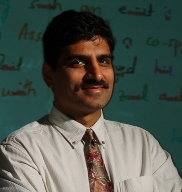Dr. Venu Govindaraju
The ScienceDaily article Technology Would Help Detect Terrorists Before They Strike said
“Airport screeners, customs agents, police officers and members of the military who silently pose that question to people every day, may soon have much more than intuition to depend on to determine the answer.Computer and behavioral scientists at the University at Buffalo are developing automated systems that track faces, voices, bodies and other biometrics against scientifically tested behavioral indicators to provide a numerical score of the likelihood that an individual may be about to commit a terrorist act.
‘The goal is to identify the perpetrator in a security setting before he or she has the chance to carry out the attack,’ said Venu Govindaraju, Ph.D., professor of computer science and engineering in the UB School of Engineering and Applied Sciences. Govindaraju is co-principal investigator on the project with Mark G. Frank, Ph.D., associate professor of communication in the UB College of Arts and Sciences.”
Venu Govindaraju, Ph.D., FIEEE, FIAPR is Director, Information and Computing Technology Strategic Strength – UB2020 Initiative, Director, Center for Unified Biometrics and Sensors (CUBS), and Professor of Computer Science and Engineering, all at the University at Buffalo (SUNY Buffalo). He earned his B-Tech (Honors) in Computer Science & Engineering from the Indian Institute of Technology (IIT), Kharagpur, India in 1986, his M.S. in Computer Science from UB in 1988, and his Ph.D. in Computer Science from UB in 1992.
In a research career spanning over 20 years, Venu has made significant contributions to many areas of pattern recognition such as document analysis and biometrics.
In the area of document analysis, he is currently working on extending his expertise in the automated recognition of both machine-printed and hand-written text in Latin script to Arabic and Indic scripts such as Devanagari and Telugu with a focus on developing interfaces for indexing and searching documents for Digital Library and Homeland Security applications.His foray into the field of biometrics began with his dissertation on the automated recognition of faces over two decades ago. He is currently investigating the strength of various biometric modalities (face, fingerprint, signature, etc.) to resist malicious attacks and provide solutions to mitigate some of the vulnerabilities, as well as the fusion of multiple biometrics for achieving higher accuracy. His recent multi-disciplinary efforts include novel applications such as deceit detection from facial expressions and voice, and odor typing for disease detection.
Venu has authored more than 250 scientific papers including 45 journal papers and 20 book chapters. His seminal work in handwriting recognition was at the core of the first handwritten address interpretation system used by the US Postal Service. He was also the prime technical lead responsible for technology transfer to Lockheed Martin and Siemens Corporation for deployment by the US Postal Service, Australia Post and UK Royal Mail.
He has been the PI/Co-PI of projects funded by government and industry for about 50 million dollars in the last 15 years. His leadership and initiative in establishing the testing and evaluation lab at CEDAR in 1998 has generated over 12 million dollars of sustained US postal funding since. The Center for Unified Biometrics and Sensors (CUBS) that he founded in 2003 has since received over five million dollars of research funding covering several projects.
Venu has given over 60 invited talks and has supervised the dissertation of 12 doctoral students and the theses of over 20 masters students. He has served on the editorial boards of premier journals in his area and has chaired several technical conferences and workshops.
He has won several awards for his scholarship. He is a Fellow of the IEEE (Institute of Electrical and Electronics Engineers) and a Fellow of the IAPR (International Association of Pattern Recognition).
Venu coedited Advances in Biometrics: Sensors, Algorithms and Systems.
